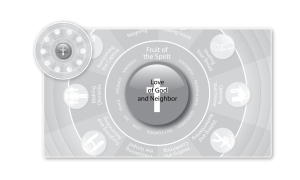Part X of our series on Preparation
 Christianity is a religion of incarnation. Jesus came in the flesh to the world God created. and we are bound for a new heavens and a new earth, where we will live in new bodies. Ours is not a religion of escaping or denying our bodies but rather a religion of our bodies achieving the purpose for which they were intended: Delivering into the visible realm that which Christ hands over to us in the invisible.
Christianity is a religion of incarnation. Jesus came in the flesh to the world God created. and we are bound for a new heavens and a new earth, where we will live in new bodies. Ours is not a religion of escaping or denying our bodies but rather a religion of our bodies achieving the purpose for which they were intended: Delivering into the visible realm that which Christ hands over to us in the invisible.
So it’s important to understand the difference between body and flesh.
Body is one of the three parts of the tripartite human being. The human is created in the image of God, who is Father, Son, and Holy Spirit. The human is spirit, soul, and body.
The soul contains our mind, will, and emotions.
The spirit is the seat of God’s life in us.
God’s design for the human being was that Adam and Eve would eat the fruit of the tree of life and take his spirit into themselves. Instead, they partook of the tree of the knowledge of good and evil, which filled their spirits with sin and death. That sin and death spills outward into the soul, darkening our mind, will, and emotions, and bringing mortality to our bodies.
This is a progressive process in history, which may explain why human beings are shown to have shorter and shorter life spans in Scripture. Mercifully God steps in to arrest that process, giving us a basic life span. That can be lengthened somewhat, but to do so is always a fight. The march is toward decay and death. As Psalm 90:10 says, “The years of our life are seventy, or even by reason of strength eighty; yet their span is but toil and trouble; they are soon gone, and we fly away.”
When Christ is invited into an individual, that individual’s spirit is brought to life. Since the contents of one’s spirit reveal one’s parentage, Jesus says that those whose spirits are filled with sin and death are children of their father, the devil, while those with enlivened spirits are children of his father.
That entry of Christ into the individual human being is called justification.
The progressive movement of the spirit outward into the soul to transform the mind, will, and emotions is called sanctification.
That movement proceeds out into the body also, but the physical realm, where Satan was thrown down, is the seat of decay such that the old creation must be destroyed and a new creation birthed as a seed from the old. Same with our bodies. That’s Hebrews 9:27: “It is appointed unto men once to die.” And 1 Corinthians 15 explains that our destiny is not to live as spooky disembodied spirits in heaven but rather to be resurrected with new bodies. That’s the basic Christian hope.
Now, God’s design is that he would continually pass into the visible realm through humans all of the gifts of heaven, and humans would receive these and pass them on to the creation.
Adam abdicates this vocation, but Christ comes as the Second Adam to re-establish it.
In God’s design, the spirit delivers to the soul all the gifts of God, and the soul passes these on to the body, which passes them on to the world.
Flesh is the reversal of that relationship. In this form, the world passes on “gifts” to the body, and the body passes these on to the soul. Whoops. Not good. Backwards plan.
Heart is an interesting word Scripturally. Heart is the reversal of flesh—body and soul in right relation to spirit, like in the following Scriptures:
“But I say, walk by the Spirit, and you will not gratify the desires of the flesh.” (Galatians 5:16, ESV)
“But put on the Lord Jesus Christ, and make no provision for the flesh, to gratify its desires.” (Romans 13:14, ESV)
“But I discipline my body and keep it under control, lest after preaching to others I myself should be disqualified.” (1 Corinthians 9:27)
Our hearts need to be retrained. And that means training the mind, will, and emotions through the Works of Piety and training the body through the Works of Mercy.
The early church called this “training for the heavenly contest.”
How does this change the way you view discipleship?











My mind immediately goes back to the dojo, a place of training. We, in Western Christianity, have bought into a Gnostic form of belief whereby the body is considered evil and only things of the Spirit matter. God values our bodies, so much so that we are to live in glorified, resurrected bodies in the Age to Come. So, how do we live today in the “already but not yet?” We can start by disciplining our bodies much like in a martial arts dojo through the Works of Mercy. Unless what we are learning is emBODIED, then we never really learn it.
Well put, Val. Now about finishing that black belt…
Pingback: How Trying to Do Good Can Result in Bad | Rev. Eric Foley